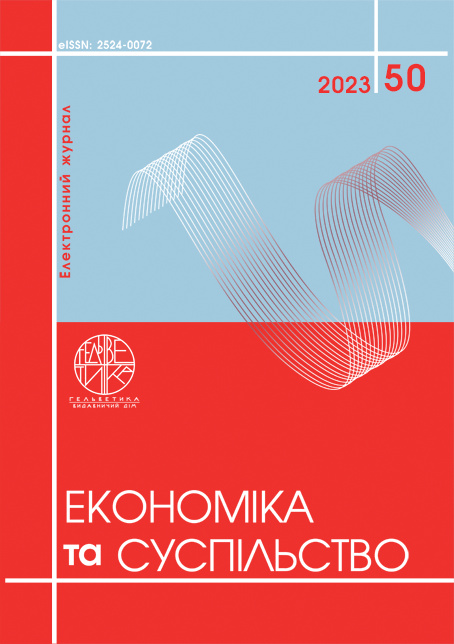HUMAN CAPITAL – THE BASE OF THE INTELLECTUAL INDUSTRY OF THE STATE
Abstract
The article deals with the problems of values formed by human capital. It is substantiated that at the stage of the post-industrial economy, knowledge, skills, creative abilities, experience, skills contribute to economic results due to the improvement of production and management processes, an increase in value and income is ensured at the enterprise, and the state receives economic growth and the accumulation of national wealth. The article also describes knowledge. With the help of human capital, new branches and intellectual industry are formed. The purpose of this article is to study the concept of "human capital" and its relationship with the concept of "intellectual capital. Now, in the conditions of the transformation of the economy, for the quality of life of society, the development of the economy of the region, the state and international relations, human capital is the main part of intellectual capital. The following factors influence the development of human capital: past period, ghanges in the economy and post-industrial period of economic development. Today, the main importance is the development of the economy in the post-industrial period. Post-industrial society is characterized by the rapid development of technology, computer technologies, and science. In the post-industrial period, education becomes more and more important, because education determines the status of a person and the knowledge a person possesses becomes a source of innovation. A person is capital, since in the material world it is the basis of income and satisfaction of various needs, namely social, creative, moral. Human capital is a specific capital that can bring income to each individual, individual enterprise and the state as a whole. The concepts of "human capital" and "intellectual capital" are closely related, because human capital is one of its main elements. By using human capital today, developed countries are managing production and economic systems, forming innovative policies. Нuman capital has such a tendency to accumulate, to exchange, which means to generate new knowledge for the creation of the state's intellectual industry.
References
Коляденко Д.Л. Людський капітал – фактор інституціальної трансформації в АПК. Ефективна економіка. 2017. № 5. С. 62–67.
Юхименко П.І. Історія економіки та економічної думки. Харків : Знання, 2011. 646 с.
Белл Д. Грядущее постиндустриальное общество. Опыт социального прогнозирования / пер. с англ. Москва : Academia, 2004. 944 с.
Bell D. Notes on the Post-Industrial Society. The Public Interest. 1967. № 7. С. 102–118.
Schulz T.W. Human Capital in the International Encyclopedia of the Social Sciences. N. Y., 1968. 384 p.
Becher G. Human Capital. N. Y.: Columbia University Press. 1964. 539 p.
Бородіна О.М. Людський капітал як основне джерело економічного зростання. Економіка України. 2003. № 7. С. 48–53.
Менкью Н.Г. Принципы экономики / пер. с англ.; 2-у изд. Санкт-Петербург : Питер, 2003. 642 с.
Фишер С., Дорнбуш Р. Шмалензи Р. Экономика. Москва : Дело ЛТД, 1995. 864 с.
Куценко В.І., Євтушенко Г.І. Людський капітал як фактор соціального захисту населення: проблеми зміцнення. Зайнятість та ринок праці: Міжвідомчий науковий збірник. 1999. № 10. С. 136–145.
Edvinsson L., Malone M.S. Intellectual Capital. Realizing Your Company's True Value by Finding Its Hidden Roots / L .Edvinsson, M. Malone: Harper Business, 1997. 240 p.
Кендрик Дж. Совокупный капитал США и его формирование: Пер. с англ. / Общ. ред. и предисл. А.И. Анчишкина. Москва : Прогресс, 1978. 275 с.
Koliadenko D.L. (2017) Liudskyi kapital – faktor instytutsialnoi transformatsii v APK [Human capital is a factor of institutional transformation in the agricultural sector]. Efektyvna ekonomika – Efficient economy, no. 5, pp. 62–67. [in Ukrainian]
Iukhymenko P.I. (2011) Istoriia ekonomiky ta ekonomichnoi dumky [History of economics and economic thought]. Kharkiv: Znannia, 646 p. [in Ukrainian]
Bell D. (2004) Hriadushchee postyndustryalnoe obshchestvo. Opыt sotsyalnoho prohnozyrovanyia [The coming post-industrial society. The experience of social forecasting]. Moskva: Akademyia, 944 p. [in Russian]
Bell D. (1967) Notes on the Post-Industrial Society. The Public Interest, no 7, pp. 102–118.
Schulz T.W. (1968) Human Capital in the International Encyclopedia of the Social Sciences. N. Y. 384 p.
Becher G. (1964) Human Capital. N. Y.: Columbia University Press. 539 p.
Borodina O.M. (2003) Liudskyi kapital yak osnovne dzherelo ekonomichnoho zrostannia [Human capital as the main source of economic growth]. Ekonomika Ukrainy – Ukraine economy, no 7, pp. 48–53. [in Ukrainian]
Menkiu N.H. (2003) Pryntsypy ekonomyky [Principles of economics]. Sankt-Peterburh: Pyter, 642 p. [in Russian]
Fysher S., Dornbush R., Shmalenzy R. (1995) Ekonomyka [Economy]. Moskva: Delo LTD, 864 p. [in Russian]
Kutsenko V.I., Yevtushenko H.I. (1999) Liudskyi kapital yak faktor sotsialnoho zakhystu naselennia: problemy zmitsnennia [Human capital as a factor of social protection of the population: problems of strengthening]. Zainiatist ta rynok pratsi: Mizhvidomchyi naukovyi zbirnyk. – Employment and the labor market:Interdepartmental scientific collection, no. 10, pp. 136–145. [in Ukrainian]
Edvinsson L., Malone M.S. (1997) Intellectual Capital. Realizing Your Companys True Value by Finding Its Hidden Roots/ L. Edvinsson, M. Malone.: Harper Business, 240 p.
Kendryk Dzh. (1978) Sovokupnыi kapytal SShA y eho formyrovanye [The total capital of the United States and its formation]. Moskva: Prohress, 275 p. [in Russian]

This work is licensed under a Creative Commons Attribution 4.0 International License.


